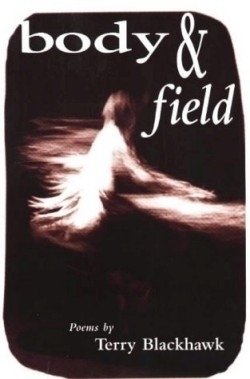
Body and Field
Terry Blackhawk’s exquisite first book of poems is one of the reasons why poetry remains an important literary force in a world where so much language is reduced to sound-bites, voice-overs and the collapsed linguistic short-hand of ad copy. Here, in five tightly woven sections of finely crafted and deeply musical poetry, we find Blackhawk telescoping metaphor from the ordinary landscapes of childhood fears and family life to the global terrain of discrimination, environment and work—especially the work of the artist. It is her astonishing diversity of subject and brilliance of metaphor that sets this first book of poems apart from many first books.
If the practice of metaphor can teach us anything about compassion, about finding common ground with the “Other,” (even if we are the Other) then Blackhawk’s work is not only gripping for its technical skill but enormously conscious of the essential need to make connections and blur categories. To do this, she effortlessly uses metaphor to pull larger more universal abstraction from the most specific of images. The text begins with a series of domestic poems, focused on simple objects such as a raku pot, a mug of tea, even a baby’s blanket—from which she explores how love connects us to the language of comfort, to the making of language itself. She writes about the change of life that comes with a son leaving home—but even in this personal issue she creates a conceit with both intimate and global flavor. For example, in “Commencement” she links a young man’s graduation night to a ceremony of Syrian boys leaping from the water wheel itself.
These early poems ground the text that then takes flight in a pattern of interwoven beast and myth imagery played out in both the ordinary events of life and the extraordinary voices of gods. Blackhawk explores childhood fear and oppression by setting up contrasting images and letting them resonate: birth to a four-footed mythical beast, wolf spider to the tarantella of fear, the horse—in particular Pegasus—and its troubling link to awakening sexuality and loss of innocence. Little Red Riding Hood, Leda, Penelope and the Minotaur take their turns speaking in a series which culminates in the long, brilliant poem “Pasiphae: What She Wanted” in which the mother of the minotaur speaks as her true self, the moon-goddess. One typical line, “These days tenderness no longer feels like tinder,” reveals Blackhawk’s ability to play with sound and paradox simultaneously. Why, after all, would tenderness feel like tinder—the answer reveals the repressed passion working under this entire section.
In the third section, “Impressionable Earth,” Blackhawk works with the way humankind has made softness impenetrable, and links it (again, the paradox) to the way in which we are impressed by those rare examples of tenderness we do find. In “Dixie, In Translation,” she works with the incongruity of a school slave banquet through the eyes of a black laundress. In “Letter from Atlanta” she connects the magnolia thrusting through the cement to the landscapes of memory and escape. Though some of these poems reflect personal moments of illness and accident, many reveal a broader political consciousness that gives the section weight and, once again, reveals her adeptness at diverse subjects.
The fourth and fifth sections are the most fascinating of the book, the fourth for its fresh look at the art of work, especially the work of women artists; the final for its delicate theme of birds, often developed as parallels for the fragility of relationships. In these sections we see virtuosity in Terry Blackhawk’s use of music in the poem. For her, the classic complements of sound and sense support her continuous exploration of complex connections and border crossings in all directions: “And I love this primary culture/clash, the seepage of one color into/another, the fungal, organic fringe/of whatever pulses across the petri dish/swells magma upward and defines the throbbing/voice of a crowd, the contours of a continent.” (The Blues, “The Bay”) In one of the finest poems, her “Ars Poetica: Clearing the Bird,” she takes the reader into the tensest of moments, freeing a trapped bird from fine and dangerous mesh. Here, untangling the delicate bird blends with the precise work of untangling thought into poem until finally it is free but we, in our self-absorption, are inattentive to the “song we sing.”
If fine poetry can ever convince us to return to the song, we will discover in it Terry Blackhawk’s compassionate and wide-ranging poetry. (March)
Anne-Marie Oomen is an award-winning poet, playwright, essayist and creative writing teacher at Interlochen Arts Academy, where she is currently writer-in-residence.
Disclosure: This article is not an endorsement, but a review. The publisher of this book provided free copies of the book to have their book reviewed by a professional reviewer. No fee was paid by the publisher for this review. Foreword Reviews only recommends books that we love. Foreword Magazine, Inc. is disclosing this in accordance with the Federal Trade Commission’s 16 CFR, Part 255.
